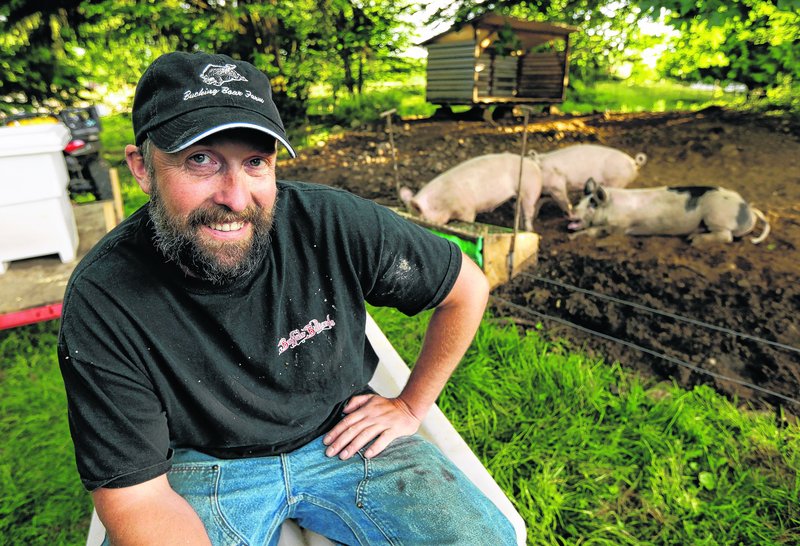SNOHOMISH, Wash. – The white van with tinted windows pulled up to the driveway with its cargo: cardboard boxes full of marijuana. And the customers eagerly awaited it, grunting and snorting.
The deal was going down for three hungry Berkshire pigs from a Washington state farm, and a German television crew was there to film it.
Part flavor experiment, part green recycling, part promotion and bolstered by the legalization of recreational marijuana in Washington state, pot excess has been fed to the hogs by their owners, pig farmer Jeremy Gross and Seattle butcher William von Schneidau, since earlier this year.
Gross and von Schneidau now sell their “pot pig” cuts at von Schneidau’s butcher shop in Seattle’s Pike Place Market at a premium price — bacon is $17 a pound while chops go for $16.90 a pound.
“He’s like ‘let’s see what kind of flavor it gives it.’ So we ran it and it gave good flavor,” Gross said. “It’s like anything else, what you feed them is what they’re going to taste like. It’s almost like a savory alfalfa-fed cow or alfalfa-fed pig.”
The meat, though, won’t get people high.
It’s just a flavor infusion.
While the passage of recreational marijuana inspired the experiment, Gross and von Schneidau get the marijuana excess — roots, stems and other parts of the plant that are ground up and not used for human consumption — from a medical marijuana dispensary. At the butcher shop, cuts from the pot pigs are signed with a little drawing of a marijuana leaf stuck on them with a toothpick.
“It tastes like the best pork chop you’ve ever had,” said Matt McAlman, who runs Top Shelf Organic, the dispensary that is providing the pot plant waste for the pigs to eat.
The idea has brought worldwide attention. On a recent afternoon, Gross hosted a crew from a German science show while von Schneidau has already been interviewed dozens of times.
The men, though, are relishing the spotlight to advertise von Schneidau’s idea of locally sourced food. Gross’ hogs at his Snohomish, Wash., farm were being fed recycled byproduct before the marijuana idea.
While Gross raises pigs on his property, he works full time as a construction foreman. The only way he can stay in the pig business, he said, is the free feed he collects from a local distillery and brewery. He feeds his pigs barrels of the distillery wheat “mash” every day, fortified by a nutrient mix his veterinarian created. Gross gets his free pig feed, while the distillery and brewery get rid of waste.
Gross is applying that model to the medical marijuana excess and von Schneidau hopes it’s an example people use as production of marijuana ramps up under the state-approved system.
John P. McNamara, a professor at Washington State University’s Department of Animal Sciences, doesn’t find the experiment amusing.
“Of all the crazy things I’ve seen in my 37-plus years, this is the dumbest thing I’ve ever seen in my life,” he said.
McNamara said in order to introduce a drug or medicine to feed that’s being given to animals that are part of the food supply, the federal government must sign off on it after extensive review. He added that research has shown that cannabis ingested can be transferred to tissues.
The U.S. Food and Drug Administration, on its website, says it “approves the additives or drugs that are used in feed products.”
Asked if feeding marijuana affects the pigs, such as perhaps giving them munchies, Gross said he can see no effect on the pigs.
But his farm manager mentioned that one of the more salty sows mellows out after a feeding.
Send questions/comments to the editors.



Success. Please wait for the page to reload. If the page does not reload within 5 seconds, please refresh the page.
Enter your email and password to access comments.
Hi, to comment on stories you must . This profile is in addition to your subscription and website login.
Already have a commenting profile? .
Invalid username/password.
Please check your email to confirm and complete your registration.
Only subscribers are eligible to post comments. Please subscribe or login first for digital access. Here’s why.
Use the form below to reset your password. When you've submitted your account email, we will send an email with a reset code.